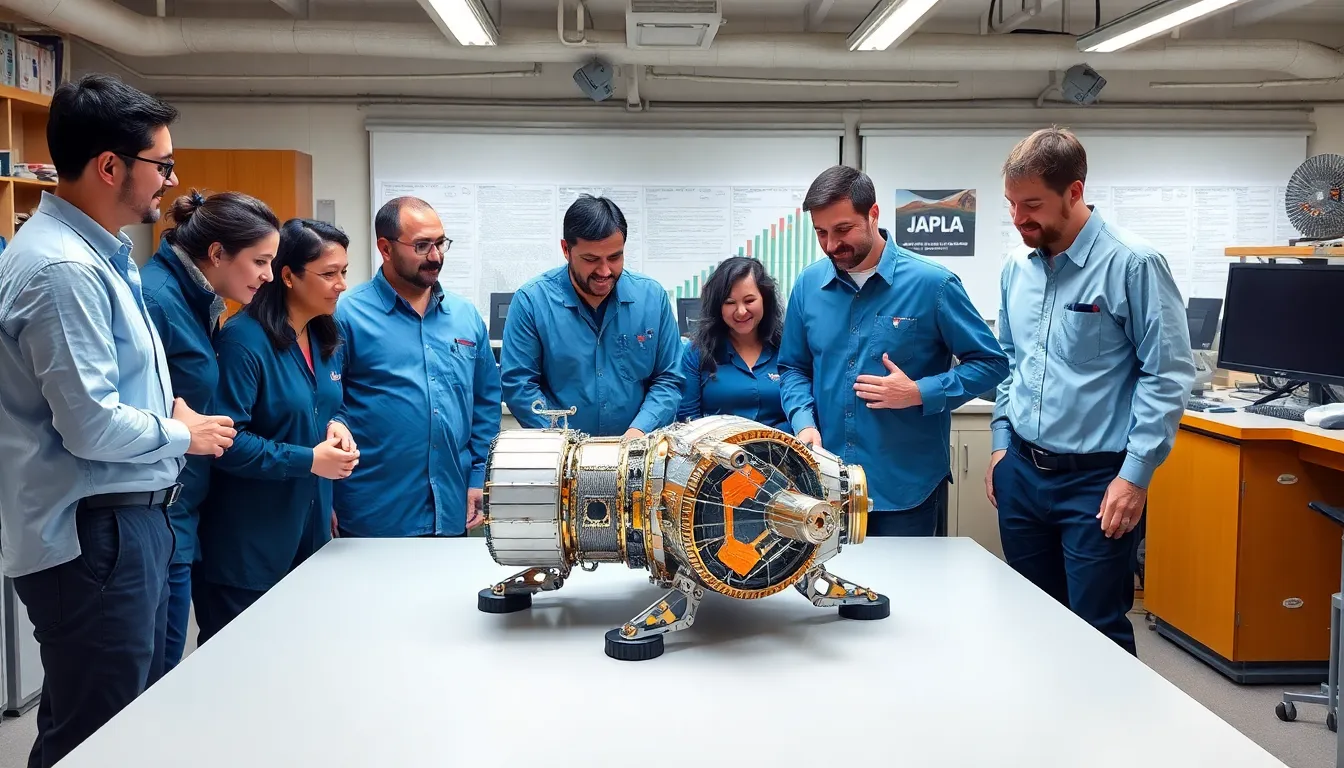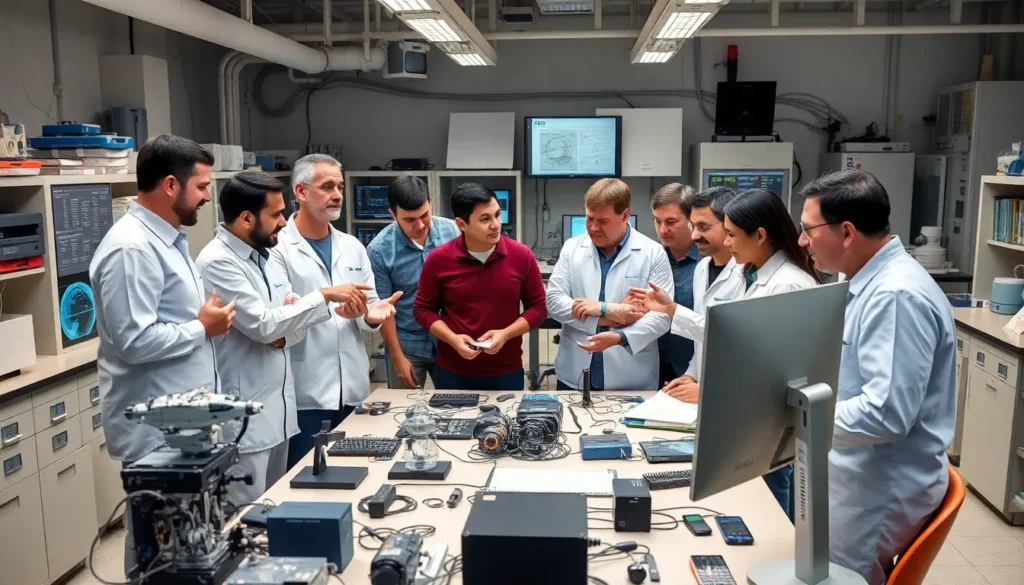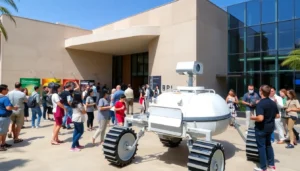Table of Contents
ToggleDreaming of a career that’s out of this world? NASA’s Jet Propulsion Laboratory (JPL) might just be your launchpad! With its cutting-edge technology and groundbreaking missions, JPL isn’t just a place for rocket scientists; it’s a hub for innovators, dreamers, and those who believe that coffee and curiosity fuel the universe.
Imagine working alongside brilliant minds who send rovers to Mars while you tackle the mysteries of the cosmos from a desk. Whether you’re a seasoned engineer or a fresh-faced graduate, JPL offers a galaxy of opportunities that can turn your passion for space into a rewarding career. So buckle up and get ready to explore the exciting job possibilities that await at JPL—because who wouldn’t want to say they work for NASA?
Overview of NASA JPL Jobs
NASA’s Jet Propulsion Laboratory (JPL) offers a variety of job opportunities across many fields. Positions encompass engineering, scientific research, project management, and administrative support. Applicants can find roles suited for fresh graduates as well as seasoned experts.
Engineers work on designing and building advanced spacecraft, robotics, and instruments. These professionals often collaborate in multidisciplinary teams to tackle complex problems. Scientists conduct research to deepen understanding of planetary sciences and space exploration. They analyze data gathered from missions to transform discoveries into valuable information.
Project managers play a crucial role in ensuring that missions stay on track and meet their objectives. Individuals in these positions coordinate teams, resources, and budgets to optimize project outcomes. Administrative roles support operational efficiency by handling various tasks that keep JPL running smoothly.
JPL strongly emphasizes diversity and inclusion in its hiring practices. The organization values different perspectives and encourages applicants from underrepresented groups. Candidates can seek internships and co-op positions to gain experience and insights into potential career paths within the organization.
Job seekers can explore opportunities on the official JPL website. Each posting outlines specific qualifications and responsibilities associated with the role. Understanding the unique culture at JPL aids candidates in finding the best fit for their skills and passions. With a history of innovation and excellence, JPL stands as a leading employer in the field of space exploration.
Types of Jobs at NASA JPL

NASA JPL offers a wide variety of job opportunities in several key areas. Each position plays an integral role in advancing space exploration and innovation.
Engineering Positions
Engineers at JPL design and develop advanced spacecraft, instruments, and systems. Roles include mechanical engineers who focus on spacecraft structures, electrical engineers handling power systems, and software engineers responsible for mission software. Collaboration occurs across multiple disciplines, ensuring each project meets rigorous performance standards. Engineers also participate in the testing and validation processes leading to successful mission launches. Candidates with experience in aerospace engineering or related fields typically find opportunities at JPL appealing.
Scientific Research Roles
Scientists at JPL engage in cutting-edge research to analyze data from various missions. Positions range from planetary scientists studying celestial bodies to astrobiologists searching for signs of life beyond Earth. Others may specialize in data analysis, transforming raw information into actionable insights for mission planning. Collaboration with engineers enhances the effectiveness of scientific research, allowing for innovative solutions to complex problems. Applicants with strong backgrounds in physical sciences, environmental science, or mathematics often excel in these roles.
Administrative and Support Staff
Administrative and support staff at JPL play crucial roles in maintaining efficient operations. Positions include project managers who oversee mission timelines and budgets, as well as human resources professionals ensuring a diverse and skilled workforce. Communication specialists also help convey JPL’s mission and initiatives to the public. Support staff ensures research teams operate smoothly, allowing scientists and engineers to focus on their groundbreaking work. Candidates with strong organizational skills and experience in administrative functions often fit well in these roles.
Skills Required for NASA JPL Jobs
Candidates considering roles at NASA’s Jet Propulsion Laboratory (JPL) should possess a mix of technical and soft skills to thrive in a dynamic environment.
Technical Skills
Engineers and scientists at JPL require proficiency in relevant software tools and programming languages. Programming expertise in languages such as Python, C++, or MATLAB is crucial for developing complex systems. Experience with data analysis techniques helps in interpreting mission outcomes effectively. Knowledge of spacecraft design principles is beneficial for engineering roles. Familiarity with laboratory equipment and testing methodologies aids in research positions. Additionally, expertise in project management software enhances organizational efficiency across projects.
Soft Skills
Collaboration stands as a cornerstone in JPL’s work culture, with teamwork essential for achieving mission goals. Strong communication skills facilitate the exchange of ideas among diverse teams. Adaptability in a fast-paced environment supports innovative problem-solving. Positive attitude fosters a collaborative spirit, essential for overcoming challenges. Leadership abilities prove vital for guiding teams through complex projects. Good time management ensures that project deadlines are met efficiently, showcasing reliability in task execution.
Application Process for NASA JPL Jobs
Applying for jobs at NASA JPL involves specific steps designed to assess candidates effectively. This section covers essential tips for crafting a standout application and succeeding in interviews.
Resume and Cover Letter Tips
Focusing on clarity enhances the appeal of a resume. Highlight relevant experiences and skills that align with JPL’s mission. Use action verbs to convey accomplishments, ensuring each bullet point is impactful. Tailoring the cover letter allows candidates to showcase motivation for the role and understanding of JPL’s work. Mentioning specific projects or missions signifies genuine interest. A concise format with clear sections helps maintain readability. Including contact information and professional references ensures completeness. Attention to detail in both documents demonstrates professionalism and enthusiasm for the position.
Interview Preparation
Researching JPL’s projects prepares candidates for insightful discussions during interviews. Practicing common interview questions and responses builds confidence. Candidates should articulate their skills and experiences clearly while relating them to JPL’s goals. Engaging in mock interviews can highlight areas for improvement. Aligning personal values with JPL’s mission reinforces a candidate’s fit for the role. Understanding the collaborative culture present at JPL is crucial, as teamwork plays a significant part in project success. Lastly, preparing thoughtful questions for interviewers emphasizes genuine interest and helps assess the right fit for both the candidate and the organization.
Exploring career opportunities at NASA’s Jet Propulsion Laboratory can be a transformative experience for those passionate about space and technology. With a diverse range of roles available, from engineering to project management, JPL offers a unique chance to contribute to groundbreaking missions.
Candidates equipped with both technical and soft skills will find a welcoming environment that values innovation and collaboration. By understanding the application process and preparing thoroughly, job seekers can enhance their chances of becoming part of this prestigious institution.
For anyone eager to make an impact in space exploration, JPL presents an exciting pathway to achieve their professional aspirations.







